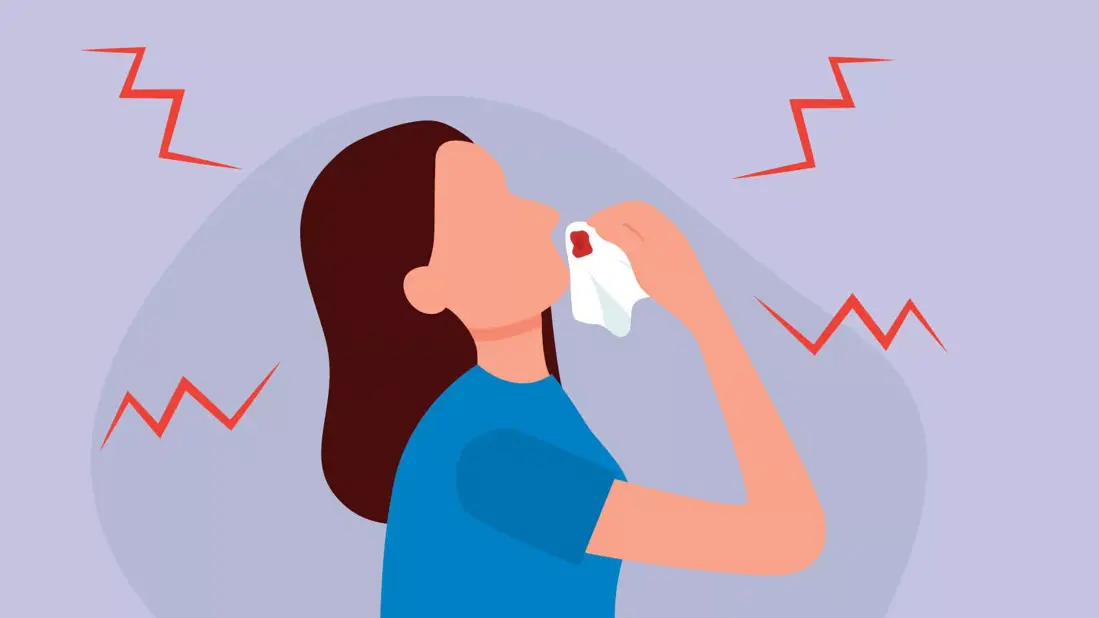
At first, it was just a few drops while brushing my teeth. Nothing dramatic. I wiped it and moved on. A few days later, it happened again. Then again. The blood came faster that third time, running from one nostril without warning. I tilted my head back like I had always seen people do. It stopped quickly, and I forgot about it. Two days later, another episode during lunch. No trauma, no blowing my nose. Just a sudden rush of red. Still, I didn’t panic. I thought maybe the weather was dry, or I had been tired. But part of me kept a quiet count. Something about the pattern felt new.
It always starts on the same side, and I wonder if that matters
Every episode began in the left nostril. Always the same, never the right. I didn’t know if it mattered. Maybe I just slept on that side. Maybe there was more congestion there. Still, I noticed the consistency. It wasn’t random anymore. Sometimes the blood dried quickly. Other times, it felt like it kept trickling from somewhere deeper. I wasn’t pressing hard when I blew my nose. I didn’t have any visible injury. The inside didn’t feel sore. But I began checking the mirror more carefully. I was looking for something I wouldn’t recognize anyway. I just wanted a reason.
I didn’t grow up with nosebleeds, so this felt unusual
As a child, I never had nosebleeds. No memories of tissue-stuffed nostrils in school. No warnings from doctors. I had seen classmates bleed from the nose during winter months. I always thought it was normal for them, but never for me. That’s what made these recent episodes feel strange. They didn’t fit the pattern of my health. Nothing about my lifestyle had changed drastically. I wasn’t living at altitude. I wasn’t using drugs or taking blood thinners. So where did this start? My body had been consistent for years. This felt like something different, and I didn’t know how to name it.
The bleeding sometimes happens when I’m asleep and that’s what unsettles me
Waking up to blood on the pillow is disorienting. It takes a second to understand. At first, I thought it was a dream. Then I saw the red on my fingers and sheets. It wasn’t a gush. Just a slow, steady leak sometime during the night. It dried in my nostril, crusted along the edge. No pain, just surprise. I hadn’t touched my face. I hadn’t sneezed. The bleeding had started and stopped without me even noticing. That was the part that stayed with me. Bleeding without knowing. What else was happening without my awareness?
There’s no trauma, no reason, and yet it keeps returning
I started eliminating possibilities. I hadn’t bumped my nose. I wasn’t blowing it too hard. No allergies, no sinus infections, no recent colds. I hadn’t been in a fight, fallen, or even scratched it in my sleep. It didn’t feel raw or bruised. There were no cuts I could see. I stopped using the fan at night in case dry air was the cause. Still, it returned. Always unexpected. Never dramatic. Just often enough to worry me. It’s the pattern that unnerves you, not the severity. When something keeps repeating, it asks to be examined.
I don’t want to overreact, but it’s hard not to Google everything
Every time it happens, I open my phone and type “frequent nosebleeds causes.” The results spiral quickly. Leukemia. Blood clotting disorders. Nasal tumors. I scroll past them, hoping for dehydration or dry weather. Still, the more I read, the more I notice small details I hadn’t before. Is it worse after I drink alcohol? Does it only happen when I forget to hydrate? Am I sleeping differently? It’s exhausting to question everything your body does. But when blood appears without reason, it’s hard not to wonder if something deeper is wrong.
I’m not sure when it’s time to see someone
The line between normal and not normal is thinner than I expected. When do you call a doctor? After three episodes in a week? After one particularly long bleed? When you start dreaming about it? I kept putting it off. Telling myself it was too minor. Telling myself other people bled more, more often. But I also kept buying tissues. I started carrying backup in my bag. I made quiet adjustments without admitting I was worried. I knew I needed someone to look up there and tell me what I couldn’t see.
Sometimes it’s just a few drops, and other times it fills an entire tissue
There’s no predictability to how much blood will come out. One morning, I saw a speck. Another time, I soaked an entire tissue in less than a minute. It varies without warning. I don’t feel different before each one. No pressure in my head. No dryness in my throat. Sometimes I only know it started because I see red on my fingers. That unpredictability creates a certain unease. If it always looked the same, it would feel easier to explain. But the body doesn’t care about consistency. It behaves in bursts and silences, not rules.
I started paying attention to what I eat and drink, just in case it’s connected
No doctor had told me to change anything, but I began watching closely. I reduced caffeine. I drank more water. I added leafy greens. I cut down alcohol, especially red wine. None of it felt like a cure, but I needed to feel like I was doing something. Some days, I thought I saw results. Then the blood would return without warning. I realized the need for control was stronger than the effect of any food. Still, those small changes helped me feel less passive. Whether they worked or not mattered less than the sense of agency.
I’m not congested, but I always feel like something’s irritated inside my nose
Breathing is fine. I don’t sound stuffy. I sleep without snoring. But something feels raw. Deep inside the left nostril, a sensitivity that doesn’t hurt—but it nags. It’s a kind of tightness, like there’s a thin wound that keeps reopening. I tried saline sprays. They helped for a day or two. Then came another bleed. Nothing crusted visibly, but the sensation remained. It’s not an infection. It’s not a cold. But it’s not nothing either. I know this body. I know when something inside it is not settled.
The air doesn’t feel dry, but maybe that’s part of the issue
I used to think nosebleeds only happened in cold climates with dry, dusty air. But I live somewhere warm, near the coast. The air is humid most of the year. Still, my nose tells a different story. Maybe it’s air conditioning. Maybe the fans move air in a way that dries me out. I turned them off. I cracked windows at night. I stopped burning candles, thinking maybe the scent oils irritated my sinuses. Still, the bleeding continued. The environment isn’t always the cause, but it can nudge something already close to breaking.
I didn’t realize how fragile the blood vessels inside the nose really are
After some research, I learned how many small veins run close to the surface in the nose. They’re thin. Delicate. They react to pressure, dryness, heat, and trauma. Even minor irritation can open them. And once one breaks, it doesn’t take much for blood to flow. I hadn’t blown my nose aggressively. I hadn’t picked or rubbed. But sometimes, just sneezing the wrong way can rupture one. Learning that made the situation feel less mysterious—but also more frustrating. If they’re that fragile, how do we protect them from daily life?
My blood pressure isn’t high, but I still wonder if it plays a role
One of the common causes of spontaneous nosebleeds is elevated blood pressure. I had mine checked. It’s always normal. Still, I think about the days I feel stressed, overcaffeinated, sleep-deprived. Blood pressure fluctuates. It’s not always captured in a single reading. Could short spikes cause small ruptures? Could they happen overnight and leave no trace by morning? Doctors told me it was unlikely. But I still notice patterns. Days with more anxiety often end in bleeding. Correlation isn’t proof—but it shapes how you watch yourself.
I started tracking every nosebleed like a logbook I didn’t want to keep
I opened a note on my phone and started logging dates, times, and side of the nose. Sometimes I added possible triggers: dehydration, heat, stress. I didn’t know what I was looking for. Maybe a rhythm. Maybe a cause. Weeks passed and the list grew longer than I expected. Ten episodes in a month. Three days without, then two in a row. No clear trigger. Just repetition. I didn’t want to obsess, but pretending it wasn’t happening felt worse. Writing it down felt like telling someone, even if it was just a screen.
Source: Otolaryngologist in Dubai / Otolaryngologist in Abu Dhabi
